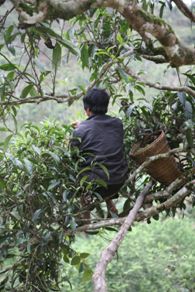1) Portrait
2) Our commitments
3) Our products
4) Contact
1) Portrait
Les Jardins de Gaïa… many years of fair trade teas with the savoury taste of Nature
Walking the path of organic and fair trade teas leads to a journey around the world of tastes, smells, rural areas, traditions, colors and humanity.
We would like to share this path with you, teach you about tea, how we love it, through faces and pictures of different parts of the world, and pass on our experiences of this enchanting drink.
During our journey, we are gratified to find real progress on the field.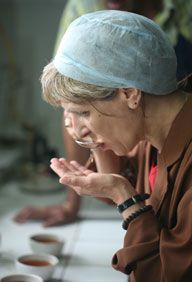
We, at the Jardins de Gaïa, consider organic and fair trade our philosophy. With this philosophy we guarantee Teas with delicious and distinct flavours, and we look to a future full of serenity, and in harmony with Men and Nature.
Les Jardins de Gaïa was founded in 1994. We were committed to organic farming and fair trade long before it became a matter of concern, we stayed the course and, today more than ever, we remain committed:
• We use local labour,
• We enter long-term supply agreements with our producers thereby building relationships,
• We provide advance financing for part of the harvest,
• We continuously improve the qualities of our teas,
• We guarantee volumes,
• We diversify the sources and the projects,
• We support small farms,
• We sponsor development milestones (and more than the obligatory allowances required in the fair trade label),
• We support biodynamic agriculture, in our eyes the only path for the survival of “Gaïa”.
We are fully committed to these principles within the framework of a truly sustainable development. The Earth and millions of people here as well as overseas are involved throughout the supply chain.
Thank you all for your loyalty - our families, our friends, our associates, our customers, our partners, producers, our fellow-members of organic farming and thank you to those whose confidence encourages us; without you “Les Jardins de Gaïa” would not exist.
Arlette Rohmer

2) Our Commitments
Organic Farming: Agriculture as a synonym of Life
Organic farming is the foundation of the Jardins de Gaïa. Cultivation, production, transformation, packing… for Arlette, it was impossible to conceive “tea” differently than within a respectful approach to nature.
The tea plant develops in areas with tropical and wet climates. Tea is a monoculture which impoverishes the soil and is planted in countries where the use of pesticides was not regulated at the time of the beginnings of the Jardins de Gaïa (it is still little regulated today). Fifteen years ago, our concern was primarily the pesticides and insecticides like DDT, lindane… Nowadays we have to consider seed-bearer autonomy, GMO cultivation, the widening of the European requirements on organic agriculture… Our everyday commitment is unconditional. It is the support for agriculture at human scale, sustainable, modern and whose techniques of production are the only ones which guarantee the sustainability of our planet.
Our teas are flavoured with organic flavours. A manufacturer of organic food product is free to choose between organic or non-organic flavour. We are careful to respect a clear policy; the choice of our raw materials is made in harmony with our commitments: our teas are flavoured only with 100% controlled organic flavours. The natural flavours labelled as organically farmed contain a 90% minimum of the mentioned source. At the Jardins de Gaïa, we have an additional commitment from our manufacturers of flavours: the supports of flavours and the solvents are fruits of organic farming.
Why prefer organic teas? Health for the Earth and for living beings
Cultivated without fertilizers or chemicals, the teas resulting from the organic farming have a double advantage. On one hand, you profit from an infusion deprived of any harmful residue, and you receive the full health benefits of tea. On the other hand, while choosing organic teas, you take part in environmental protection!

Biodynamic agriculture: A comprehensive approach of ecology
Exceeding the notion of using natural fertilization modes (use of compost and manure); the biodynamy concept also integrates social, economic, human and ethical concerns.
Biodynamy also uses the solar and lunar rhythms, the rotation of crops, the consideration of biotopes favourable to the plant development, the consideration of the genus adapted to local climates, the maximum energy autonomy of the exploitations
From all points of view, the methods of biodynamic agriculture seem ideal. However they are not obvious to apply when it comes to a monoculture like tea. Our Demeter labelled teas (as well as some mixed herbal teas) come from India and Sri-Lanka.
In these Hindu and Buddhist countries, organic farming was re-introduced in 1980’s, first as an economic solution, then as benefits became self-evident biodynamic farming practices were put into place.
Being universal, part of the bases of the biodynamy encompasses religious values, astrological practices, traditional medicine, Ayurveda… concepts which hold a master position in the culture of these two countries.
Programs for distribution of biodynamic preparations, seedling, planting, pruning, fertilization and preparation of the compost are realizable in India. For the crop protection, local plants manures are employed. The endemic European plants used in some preparations are cultivated for fertilizer, or replaced by local plants.
Producers of Selimbong, Oothu, Putharjhora in India and of SOFA in Sri Lanka have chosen biodynamy. It should be noted that the gardens of Seeyok, Singell and Samabeong also use the practices of biodynamy but are not labelled as such. Over the last decade, one can see in these gardens, the diversification of the cultivations (it is common to find spices and fruits trees among the tea plants), the development of traditional methods of agriculture, the safeguard of some species and the respect of ecological equilibrium (in Darjeeling, the soil erosion due to old intensive practices of deforestation is clearly on the decline). Obviously this is resulting to an improvement of the life quality!
Source and documentation: www.bio-dynamie.org
Fair trade: A bridge over there and here
For us at the Jardins de Gaïa, the development of long term relationship with our producers is the only way of conceiving “tea”.
We import, distribute and drink tea, thanks to bonds built and maintained over years and decades. We can thus ensure our producers, a certain sales volume which remains stable (or may increase), and no matter the encountered difficulties: climatic changes, fluctuations of prices, this ensures you a constant quality of products. The foundation of fair trade goes hand in hand with creating and developing les Jardins de Gaïa. We supported fair trade before it became trendy, because it met our most strict requirements. Our commitment was strong from the beginning; and has been reinforced with the passing of time by our on-site experience and today, it appears to be more necessary than ever …

Fair trade is today a dynamic branch of the industry in full expansion, and to which the consumer is sensitive. As for organic and biodynamic agriculture, the use of a label appears essential to us, as for the visibility and the clearness of a certain behaviour. Although our standards go above those of fair trade, we chose the Max Havelaar logo for our teas certification in 2001. Sometimes criticized, and misunderstood, “Max Havelaar” is in France, the most famous and recognized label to certify products under fair trade. This label is the minimum insurance for the consumer, and guarantees the respect of the standards and the principles of fair trade.
Max Havelaar is a non-profit-making organization. It does not buy or sell any product but profits from extensive onsite experience and wealth of knowledge. As other organizations of fair trade, it depends of FLOCERT (Fair labelling Certification) which is the certifying entity.

A new initiative: Trust Organic Small Farmers
Born in 2007 the club Trust Organic Small Farmers is a non-profit based organization, founded by producers, traders and NGOs from different corners of the world. This club, to which belongs the Jardins de Gaïa, is not a closed society of tea specialists, nor a new agency of certification. It is an initiative of people involved in the tea market with an approach of sustainable development whose goal is to promote small producers. Even if the products of small producers are certified organic, or if they are labelled “fair trade”, there is no guarantee that their whole harvest will be sold on the local or export market.
Each member of this club is certified organic and fair trade and we aim to provide additional support to the small farmers. We work toward bringing closer these two certifications (organic and fair trade) and if necessary to resolve some inconsistencies as for the situation of the small producers. In addition to our support to the small producers, we help to develop marketing and public relations, we support environmental and ethical education and we sponsor sustainable development.
In other words, our main goal is to improve the social and economic situation of organic farmers, throughout their activities on the market (those activities being fairly paid).
Our objectives are:
• To maintain and improve market access for the products of small producers.
• To work towards a better recognition of the “small farmers” in organic farming and fair trade.
• To improve the exposure of this niche and to develop support for the small organic farms.
• To improve the social, economic and ecological conditions in the regions of production.
• To work closely with the producers to support our project and to make it sustainable. For this we need the support of traders, the “marketers”, the NGOs and of course, the consumers.
“Eco-Ethic Five Star Standard”
The consumers buying products from the members of the Trust Organic Small Farmers club are ensured they will receive certified organic products, of good quality, at reasonable prices, and which are manufactured by combined fair trade and sustainable development.
The products coming from small producers must meet the following standards:
• Certified products resulting from organic farming (includes farmers with reconversion label towards organic farming)
• Fair business practices proven throughout the life cycle
• Excellent quality
• Development of rural farms with a special attention to family farming
• Innovating development projects including bonds with the consumers
Like a breath of fresh air, this very new project results from a strong alliance based on honesty, professionalism and engagement of people involved in organic and fair trade. It is the proof that the “competitors” of the same market can come together and work toward a common cause when the cause is right and deserves to be supported.
Since 2010, the packaging of our products coming from small farmers includes the logo “tea from small farmers”.
http://www.facebook.com/pages/Trust-Organic-Small-Farmers/217697831583809
“Les Jardins de Gaïa”, a Colibris company !
Being a Colibris company means walking on a path towards more consistency, as well as in personal entrepreneurial action. A Colibris company:
• Subscribes to the International Charter for Earth and Humanism.
• Has the will to think, exchange, and work with other companies, citizens and elected officials.
• Takes part in inventing new ways of life and new possibilities for combining economic activities with the requirements of life.
• Believes in the strength of autonomy, of local consumption, of co-operation and happy temperance.
• Belongs to a society, both individually and as part of a company, where people and nature are major concerns .
The values we protect:
Here:
• We favour local work and rural employment
• We support employment of underprivileged people
• We support economic, social and cultural networks in local areas
• We protect handcraft work
• We favour quality and diversity of products
• We educate on organic, biodynamy, fair trade and on support for small producers.
There:
• We ensure partnerships in the long run
• We diversify our sources to guarantee work for all
• We maintain close relationships with the producers and make regular visits to support the development, to advise, educate, inform and help to improve products´ qualities
• We commit ourselves beyond the standards required by fair trade (financing, assistance for irrigation, construction of nurseries, gifts of seeds, emergency help, natural disasters, etc.)
• In particular we support small producers’ structures
• We support biodynamic farming, for us the unique solution for the survival of “Gaïa”.
Wild tea plants

In the dense tropical forests of the Gold Triangle Mountains, ancient wild tea plants still grow. These old varieties of the CAMELIA Sinensis, outstanding by the high concentration of its leaves, give teas of high-quality! We propose teas from Vietnam, Laos and Yunnan (China) coming from these wild plants.
The promotion of these tea plants helps against deforestation in this area of the world.
For more information, please consult:
Fair Trade Projects
Using the Max Havelaar logo, you will easily find the origin of teas associated with these projects.
As for organic flavours, we felt logical to undergo throughout our process, using fair trade labelled teas for our flavoured teas and our mix. In order to obtain a tasty and balanced tea, we use vintages of various sources to compose the bases of our flavoured teas. That enables us to support all the small co-operatives in the world.
|
India
Sri Lanka
China
Region : Yunnan Mannong
Da Zhang Shan
Bao Kang
Shau Wu
Region : Hunan Guzhang Gaofeng
|
Southern Africa
Ericaville
VietnamRegion : Yen Bai
Region : Lam Dong Lam Dong Oolong
LaosRegion : Southern Laos, Pakson
Tansania
EgyptSekem Demeter certified Zimbabwe
JapanAiya
South KoreaOrganic farm on Seogwang island
|
3) Our products
Our products include Tea selections for all tastes as well as original and delightful “home-made” recipes, aromatised with 100% organic aromas:
Teas: Green, Black, Oolong,White
Specialities: Pu Erh, compressed teas, sculpted tea, Darjeeling first flush, Japanese green tea, blends and “Home-made” flavoured teas
Rooibos, Honeybush, Mate, Lapacho, Fruits teas and herbal teas, Spices
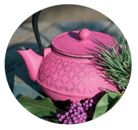
We also have a wide choice of accessories for tea preparation from Japan, China and Vietnam.
As well as books and incenses.
In accordance with our philosophy, all components like, papers, packaging and inks used are coming from natural and organic resources and are gen tech free.
The different varieties of teas: A palette of colours and tastes
White Tea, green tea, black tea, from China, from India, from Japan or elsewhere are all varieties resulting from only one plant: the tea plant. The leaf, once picked, is processed in many different ways and undergoes many transformations.
According to the soil, the smoothness of the leaf and the manufacturing process, one obtains a palette of unlimited tastes and varieties. ..
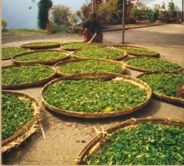
White Tea
At the origin, white tea is an endemic variety of the Fujian province in China. Today, the market of white tea is flourishing: it is also produced in other Chinese regions (Yunnan), in India (Darjeeling, Nilgiri) and in other countries. The variety of origin of the tea plants used for white tea is easily recognizable by its leaves covered with a light white hair. Unlike the other teas, the buds and leaves do not undergo any transformation. They are dried immediately after picking.
Yellow Tea
Cultivated in the province of Hunan, China on very small plots of land, this tea is made only from buds. Its yellow colour is obtained by a braised torrefaction in straw covered basins. This variety of tea, resulting in a yellow gold infusion, is rare, fleeting and expensive. App. 300kg per annum is consumed worldwide.
Green Tea
Green teas are not fermented teas. There are two manufacturing processes for these teas: the Chinese method (most widespread) and the Japanese method. Instead of being heated, the leaves are processed by vapor above a water bath in order to avoid fermentation after picking. This gives the leaves suppleness and keeps their freshness.
Our Japanese teas (and our great Chinese vintage) are packed under vacuum, in order to keep an impeccable quality and especially to preserve this typical taste obtained by their manufacture.
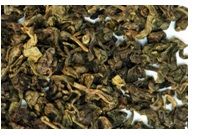 Oolong Tea
Oolong Tea
Oolong, Wu Long, Blue-Green or semi fermented are various names used for this variety of tea. Resulting from an interrupted fermentation, this tea is a delicious compromise between green and black tea. There are several thousand varieties of it. Traditionally of China (Fujian) or Taiwan, oolong tea is nowadays manufactured in many other countries (India, Laos, Vietnam…). The tea plants used are varieties with the large leaves. Adapted to each soil, the manufacturing process of oolong tea is nevertheless copied on the techniques of the two countries of origin.
In China, oolong teas are known as “teas of balance”. Indeed, oolong tea preserves the properties and the freshness of the green teas and gives a flavour close to the best qualities of black teas.
Black Tea
During the seventeenth century, when the first transports of Chinese green teas were organized, a cargo of teas arrived in Europe unexpectedly mildewed and fermented during the journey. Sold as such, these teas were consumed, appreciated and thereafter in demand. Black tea was born.
Myth or legend, this tea with complete fermentation is today the most consumed variety in the world.
With milk, mixed with spices, accompanied by a slice of lemon or simply plain, the tastes and practices of tastings are numerous and vary from country to country. From early vintages of Darjeeling (India), to the “frog tea” of the Chinese mountains, while passing by the strong teas of the plains of Assam, qualities are, as for the other types of teas, a function of the soil, the period of harvest, the talent of the grower, the grade of the leaves, and especially of the picking.
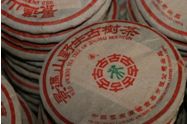
Pu'Er, dark tea from China
From secular traditions, this Chinese endemic tea is a very particular black tea. At the borders of Burma, Laos and Vietnam, in the area of Yunnan, the nomadic tribes produced and drank the first Pu-Erh teas under the reign of the Mandchous emperors (618-907).
Today, the Pu-Erh teas of the Jardins de Gaïa are still manufactured in this region of China. The leaves are picked by ethnic minorities in the heart of the rain forest. Some trees are 1500 years old.
Rooibos, tea, which is not tea
In Europe, this drink has been called red tea for a long time. Its manufacture is similar to the black tea process, the colour of its infusion is red and its origin name is “Rooitea”. This little confusion has given Rooibos its marketing name: red tea.
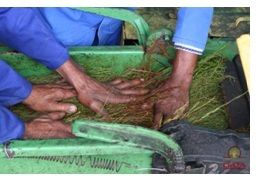
The rooibos (lat. Aspalathus linéaris) is originated from the area of Cederberg in the south-west of South Africa and belongs to the family of leguminous plants. This shrub with tiny needle shaped leaves in narrow ramifications grows above 800 meters altitude, on a sandy soil under arid climate. Its delicate needles are used for the manufacturing of the “tea”.
A rooibos plant lives on average seven years. The plant starts to produce sufficiently for its use only after one year and half; its production reaches its maximum after three years then drops gradually. Before dying, the needles are tinted red (that is the origin of its name rooibos, which means red bush).
Honeybush (lat. Cyclopia genistoides)
This shrub of South Africa is processed almost in the same way as the rooibos. Its gold colour infusion is characterized by a perfume of flower and of mountain honey. This soft drink, with a mild sweet taste, stimulates the appetite and favours lactation. It is also used in South Africa to clear the throat and is associated with other plants. Not containing theine, it is pleasant any time in the day.
«Teas» of South America : Fitness drink
Lapacho (Tecoma curialis variety Tabebuia impetiginosa or avellanedae)
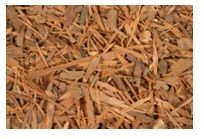 Called Pau d’Arco or Ipe roxo in Brazil, the lapacho is a tree with resplendent flowering which grows in the heart of the Amazonian tropical forest. This tree, which is immunized against infections coming from mushrooms of this area, was discovered by the Kallawayas Indians of Brazil. They boiled its sapwood (internal bark) to preserve the health and immunity of their tribe.
Called Pau d’Arco or Ipe roxo in Brazil, the lapacho is a tree with resplendent flowering which grows in the heart of the Amazonian tropical forest. This tree, which is immunized against infections coming from mushrooms of this area, was discovered by the Kallawayas Indians of Brazil. They boiled its sapwood (internal bark) to preserve the health and immunity of their tribe.
The lapacho sapwood sold at Jardins de Gaïa is taken from trees in the heart of the tropical forest. The inhabitants living along the river at the forest edge are doing the harvest and processing the transformation of the bark. The harvest of these trees belongs to an Amazon forest protection project named Hiléa. The purpose of this project is to repurchase small portions of the forest in order to ensure its protection. We work with the support of Instituto de Desenvolvimento Sustentàvel de Mauès, together with the natives living along the river, toward the sustainable development of this area.
Mate (Ilex paraguariensis)
Also called “tea of Paraguay”, “Jesuits tea” or “St-Barthelemy grass”, mate is a drink made from leaves of a South American species of holly. The tree develops in a hot and wet climate and its height varies from 6 to 15 meters. An evergreen, it is integrally part of the natural vegetation of the forests of Paraguay, of the south of Brazil and Argentina. It can live up to 80 years.
Mate is a fixture of Latin-American culture; it is drunk in a traditional container called a mate (a type of calabash) with a bombilla (a kind of straw). Its consumption is a daily ritual. Its infusion is stimulative and contains caffeine. Bound to the chemical component of the plant, its caffeine acts more slowly and gently and constantly than coffee. In normal use, drinking mate neither leads to insomnia, nor to anxiety or excitement. Regularly used by local medicine, this beneficial drink is rich in chlorophyll, in vitamins C, A, B1 and B2, in calcium, magnesium and manganese. It helps kidney function, digestion, blood circulation and helps to fight against fatigue. It is a valuable help in weight lose diets.
Country of tea origin
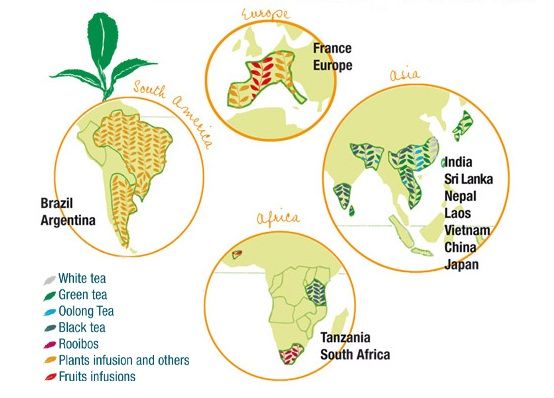

4) Contact
Export manager: Private labelling & Flavouring
Tel: + 33 (0)3 88 85 96 50
Email : [email protected]
Our address :
Les Jardins de Gaïa
ZA - 6 rue de l'Ecluse
BP 60226 Wittisheim
F-67604 Sélestat Cedex
Alsace
Mail-order:
Phone: +33 (0)3 88 85 88 30
Fax: + 33 (0)3 88 85 96 55
Email: [email protected]
www.jardinsdegaia.com
Please visit our Tea House Mondays from 1pm to 6pm and from Tuesday to Saturday, 10am to 12pm and 1pm to 6pm.
Phone: + 33 (0)3 90 56 20 22
We welcome your in our Tea Shop from Monday to Saturday, 10am to 12pm and 1pm to 6pm.
Phone: + 33 (0)3 90 56 20 20
 Most of Jardins de Gaïa’s products are available in the UK at EqualiTea. EqualiTea's mission is to offer you lots of ethical products related to tea.
Most of Jardins de Gaïa’s products are available in the UK at EqualiTea. EqualiTea's mission is to offer you lots of ethical products related to tea.
Please visit www.equalitea.co.uk for information on stockists, events, and for specific preparation advice for each tea.
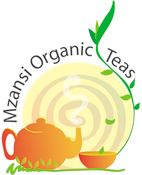
Les Jardins de Gaïa’s teas are available in South Africa at Mzansi Organic Teas. A selection of the 50 most popular teas, blends and flavoured recipes are already available, and new ones can easily be added on request. Mzansi Organic Teas tends to educate and promote high quality teas with values and ethics and we are inspired to share and educate others on Small Farmers and the great quality teas that these farmers produce.
Please contact us at [email protected], for information on stockists, events, and for specific preparation advice for each tea.
Join us on facebook Mzansi-Oragnic-TEAS
Follow us on twitter #MzansiTeas


